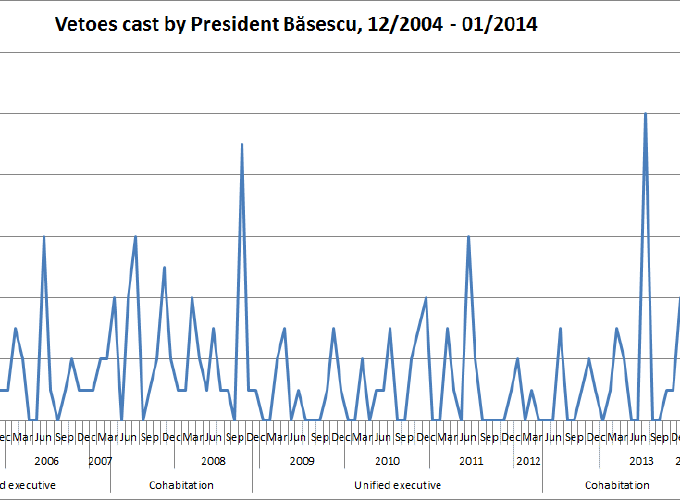Blog post published by presidential-power.com
Since December 2012, when the last general election took place in Romania, President Băsescu has vetoed 26 bills. By comparison, during the first legislature of his first term (2004-2008), President Băsescu vetoed over 80 bills, while during the second legislature (2008-2012) he vetoed about 40 bills. Thus, the incumbent president appears to be particularly active at the beginning of the third legislature, which coincides with the end of his second presidential term.
It is tempting to put down such a high level of presidential activism to the cohabitation between the president and the ruling coalition composed of the Social Democrats (PSD) and National Liberals (PNL). We can test this hypothesis by comparing the number of vetoes President Băsescu has cast since May 2012 with his overall veto activity since he took office in December 2004.
According to the Romanian Constitution, the president can ask the parliament to re-examine any bill once before promulgation (art. 77). The graph below presents the number of vetoes President Băsescu has cast since December 2004. The data was collected from the press releases published on the website of the presidency and from the online records of the Chamber of Deputies.

The graph shows the monthly distribution of presidential vetoes and indicates the political relationship between the president and the government. Periods of unified executive take place when the president and the prime minister belong to the same party, a divided executive occurs when the president and the prime minister belong to different parties but the president’s party is represented in government, and cohabitation occurs when the president’s party is not represented in government.
Thus, President Băsescu took office under a scenario of divided executive, as the coalition government formed by Băsescu’s Democratic Party (PD/PDL) and the National Liberals (PNL) in 2004 was led by PM Popescu-Tăriceanu, the PNL leader. The first period of cohabitation started in April 2007, when PD/PDL left the coalition, and lasted until December 2008, when PDL won the general election. The second period of cohabitation started in May 2012, after the ruling coalition led by PDL was defeated in a confidence motion and the PSD-PNL opposition formed a new government that excluded the president’s party. The period of cohabitation continued after the 2012 election, when the PSD-PNL incumbent government won a huge majority in the general election.
The data does seem to confirm that President Băsescu has used his veto powers more frequently during periods of cohabitation than under unified or divided executive. However, the differences in veto activity are not so great in quantitative terms across the three executive scenarios. For example, President Băsescu vetoed over 40 bills between 2009 and 2012, when the government was led by his designated successor as PDL leader.
The increase in the number of vetoes cast by the president might also be explained by a change that has taken place in his relationship with the PSD-PNL government.
In October 2013, President Băsescu accused PM Ponta, the PSD leader, of violating the so-called cohabitation pact signed in December 2012. The pact concerned both parts’ commitment to respect their constitutional roles, following several months of ongoing institutional conflict that included a referendum to impeach the president in July 2012. Thus, the increase in the president’s veto activity could be put down to the worsening relationship between the president and the government. For example, in December 2013 the president threatened to veto the 2014 budget unless the government agreed to give up a new excise tax on fuel. In the end the president promulgated the budget law, but only after the prime minister agreed to postpone enforcing the new tax. Thus, as the next presidential election scheduled for November 2014 is coming closer, we may expect the president’s veto activity to remain at a high level.


